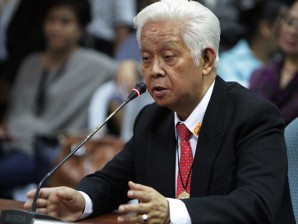Comelec chief firm on alphabetical listing for party-list groups in 2013 polls
See you in court.
This was the message from Commission on Elections (Comelec) Chairman Sixto Brillantes Jr. to party-list lawmakers opposed to the poll body’s plan to raffle slots on the ballot for party-list groups running in next year’s elections.
“We came out with the resolution and now anybody can question it before the Supreme Court. They should just question if they don’t really want it,” Brillantes said in reaction to the objections aired by party-list House members Neri Javier Colmenares (Bayan-Muna), Sherwin Tugna (Cibac), Carol Jane Lopez (Yacap) and Emmeline Aglipay (Diwa).
The Comelec chief disputed the party-list members’ contention that the random listing of the names of the party-list groups could cause confusion, prolong voting time, and cause inconvenience to vision-impaired and elderly voters.
“There is no basis [to their concerns]. They’re the ones confusing the situation. We’re the ones fixing it. Nobody is confused. The new resolution [was adopted] precisely to avoid confusion. They may only be confused because they do not seem to see the benefit of this system,” Brillantes said.
Article continues after this advertisementHe said he did not think voters would have any difficulty looking for the names or acronyms of the party-list groups they want to vote for in the ballot.
Article continues after this advertisement“They have to campaign with their assigned number and place their numbers in campaign posters like before (in the 2010 elections). How can that be hard? Most of them (names or acronyms of the partylist groups) start with A or 1 anyway,” said Brillantes.
Colmenares has argued that doing away with the old alphabetical arrangement would only benefit “rich” party-list groups which can afford to launch expensive campaigns for their party and their assigned number. The “poor” party-list groups rely on the alphabetized listing since voters would have an easier time to locate the groups’ names on the ballot, he said.
Colmenares said he was not aware of anyone officially complaining about the alphabetical system so he wondered why the Comelec changed the rules.
“After all, in the end, it is the party-list organization’s platform, track record and capacity to campaign that wins the seat rather than the fact that it placed three As or 1s on its name,” he said.
Last April, Comelec accredited 127 party-list groups, of which 67 had acronyms beginning with A and 10 beginning with 1. The poll body is now processing the applications for accreditation of 172 new groups, of which 59 have acronyms starting with A and 32 starting with 1.
